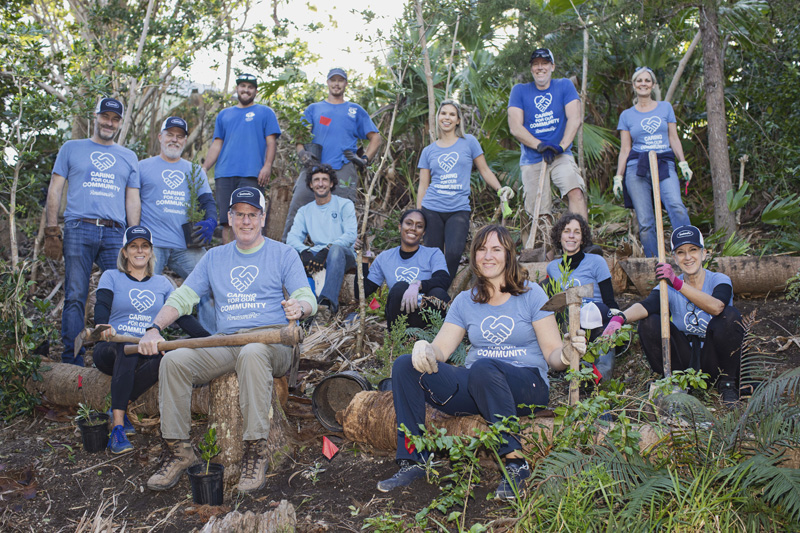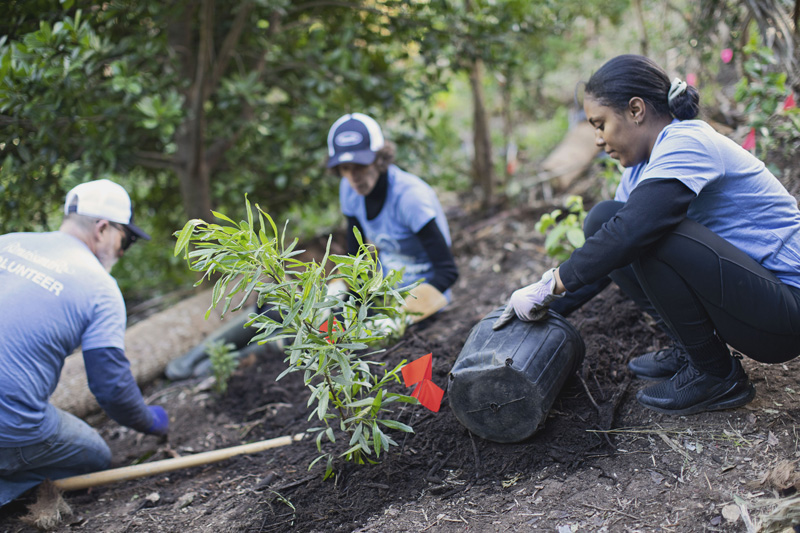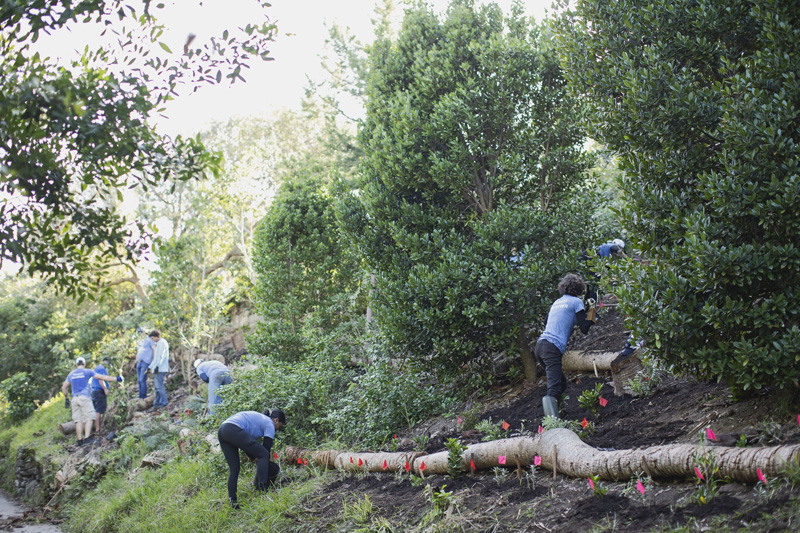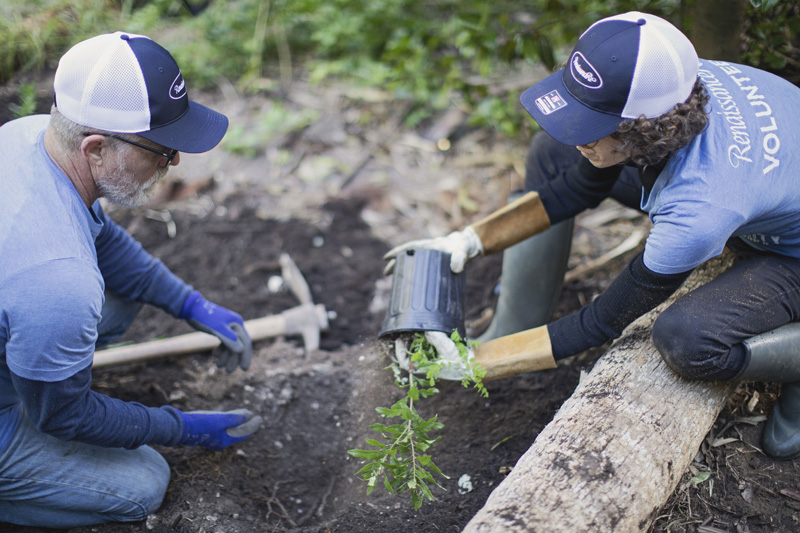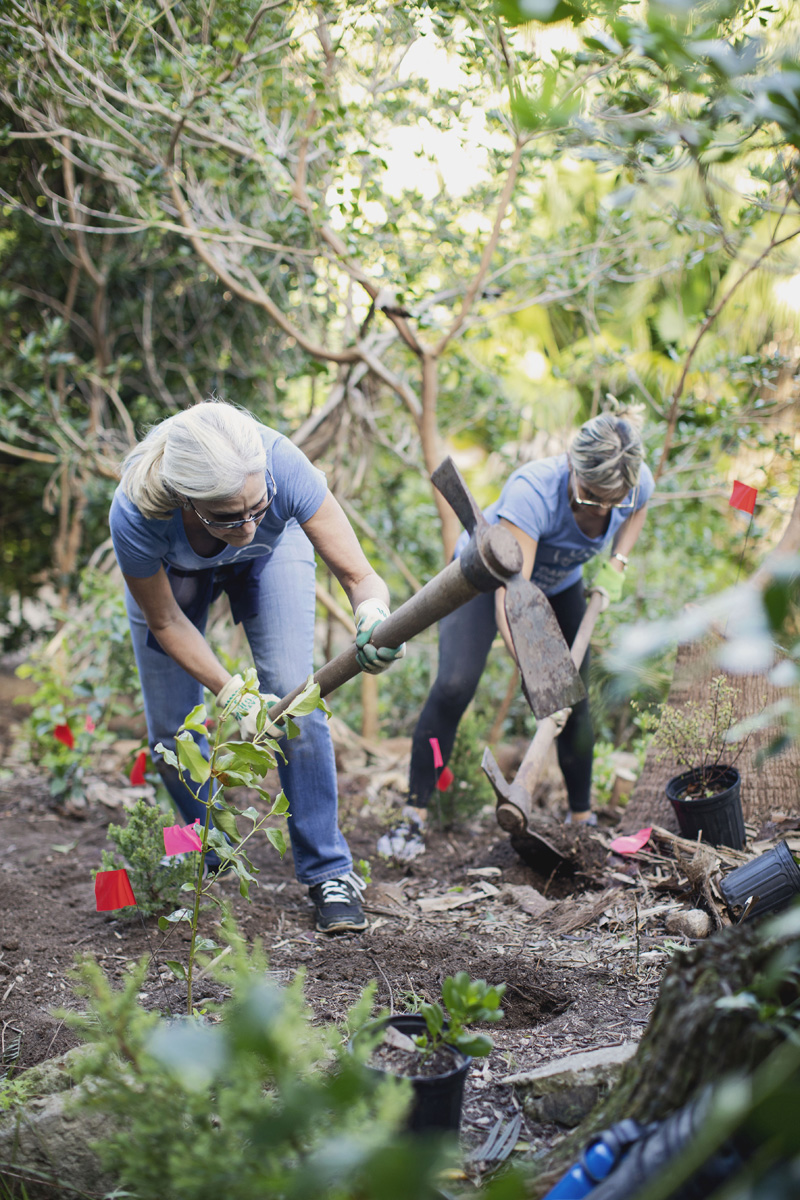Successful First Year Of Micro Forest Project
The Bermuda Zoological Society [BZS] has highlighted the BZS Micro Forest Project, which has an aim to plant 1,500 native-compatible and endemic plants each year for three years.
A spokesperson said, “The Bermuda Zoological Society [BZS] is an education, conservation and research charity with the environment at its core. And big things are happening for our BZS Micro Forest Project in 2023. Ten new BZS Micro Forest sites, 1500 more seedlings planted and, most importantly, an exciting new corporate partnership that will take us into Year Two of the project.
RenaissanceRe employees left to right: Jeff Manson, Nicole Johnson, Mark Eldridge, Kevin O’Donnell, Janaya Caines, Alyssa Rose, Angela A’Zary, Keith McCue, Stephanie Henderson Wernbo, Melody Rance, Cathy McNiven; Bermuda Zoological Society Team left to right: Nicholas Coelho – Micro Forest Coordinator, Nigel Pollard – Endurance Captain, and Trevor Rawson – Trunk Island Project Coordinator
“The BZS Micro Forest Project, Bermuda’s Official Micro Forest Initiative, was launched in December 2021 and is the first local project of its size helping to boost native and endemic biodiversity while also helping mitigate climate change by capturing and storing atmospheric carbon dioxide through photosynthesis.
“These tiny, dense forests, often sited in schoolyards or alongside roads, support local and migratory wildlife and extend experiential learning opportunities that connect students to the benefits of trees, conserve our natural resources, and foster environmental stewardship. The dense planting schemes are designed specifically to help promote the native and endemic plants while also crowding out invasives species which currently make up the majority of Bermuda’s forests.
“In December 2021, our Founding Partner, RenaissanceRe [RenRe] launched the BZS Micro Forest Project with the planting of the inaugural plot in Jennings Land, on North Shore. How fitting, that RenRe ended the successful first year of the project with a planting at Admiralty House – a 717m2 plot, the largest area the project has undertaken to date. On Thursday 15th December, 17 members of RenRe joined the BZS Micro Forest team for 3 hours to plant 305 plants, made up of 16 different native species.”
“Through the brilliant efforts of the RenRe team, we were able to achieve planting the largest plot to date, the most individual native plants planted in a day and the highest number of species planted in a Micro Forest thus far!” said Trunk Island Project Coordinator, Trevor Rawson. “It was a challenging plot, and the team dove in headfirst to complete our 10th BZS Micro Forest! Thanks again to everyone involved!”
“As part of our longstanding commitment to promoting climate resilience, we are proud to be the founding corporate sponsor of the Bermuda Zoological Society’s Micro Forest Project. We look forward to working with the Micro Forest Project to protect endemic plant life in Bermuda, raise awareness of the importance of biodiversity in combating climate change, and cultivate community collaboration to create further impact.” – Jeff Manson, SVP, Underwriting and Head of Global Public Sector Partnership, RenaissanceRe.
One year later, what are the results
The spokesperson said, “2022 marked significant moments for the project: Our Founding Partner, RenaissanceRe, was joined by Aeolus, Convex, Vantage Risk, and Aspen Bermuda Ltd., the Bermuda Parks Department and many volunteers. Impressive energy runs through our micro forest community as we all work together in areas where we can make the most impact.
“The goal of the BZS Micro Forest Project is to plant 1,500 native-compatible and endemic plants each year for 3 years. Thus far, the project has 10 established plots – including Jenning’s Land – North Shore Road, Warwick Playground Park, Flatt’s Village Pier, Coastal Mangrove – Trunk Island, Trunk Island – BZS Living Classroom, Dalton E. Tucker Primary School, BAMZ Coastal Walkway, Spittal Pond, Riddell’s Bay and Admiralty House. Multiple additional plot locations have been identified such as Elliot Primary School and are being prepared for planting.
“Within the 10 established plots, 1,610 native-compatible and endemics plants have been set out, with a plant survival rate to date of over 90%. The plants are comprised of 28 different species – including Bermuda Olivewood, Green Buttonwood, Bermuda Palmetto, Bermuda Cedar, Sea Oxeye, Jamaican Dogwood, Bermuda Snowberry, Seven Year Apple, Turkey Berry/American Beauty Berry, Tassel Plant, Doc Bush, Darrell’s Fleabane, Tunera, Yellowwood, Box Briar, Coast Sephora, Red Mangrove and Foresteria.
“Volunteers are crucial to our work. In addition to planting the native-compatible and endemic plants in the Micro Forest plots, this year, 387 volunteers provided 1,101 hours of chopping, digging, culling, weeding 32,090 invasive plants! We could not care for and safeguard Bermuda’s biodiversity without them. Our volunteers come from various backgrounds and age groups, bringing a wealth of skills, knowledge and expertise to the project.
The future
“To help restore ecosystems, we must continue planting micro forests. On roadsides, in our schools, in our own backyards. The BZS Micro Forest Project heads into the second year knowing that micro forests are a powerful way for people to connect with nature. This project can involve the entire community and help people think more deeply about their role in alleviating the climate crisis through a shared mission to inspire appreciation and care of island environments.
“In 2023, we will continue to build on our success to create another 10 micro forests with the goal of planting a further 1500 native and endemic plants with the support of new partner, HSBC, and their staff volunteers. Together we can make a significant impact to protect and enhance wildlife habitat and biodiversity, absorb carbon, enhance physical resilience from extreme weather events, cool the land and provide the community with methods to get involved in a greener future.
“The shared mission of BZS and BAMZ is to inspire appreciation and care of island environments, and as the support charity for BAMZ, the BZS is an example of a highly successful non-profit/public partnership. Each year the BZS provide more than 8,000 free educational experiences through our Stempel Foundation BZS Schools Programme in addition to popular community programmes for all ages, development of BAMZ exhibits, and conservation and research programmes. Each year, BZS Volunteers contribute over 10,000 hours of valuable husbandry support to the Aquarium and Zoo with all programmes being accredited by the Association of Zoos and Aquariums.”
Read More About
Category: All, Environment, News

